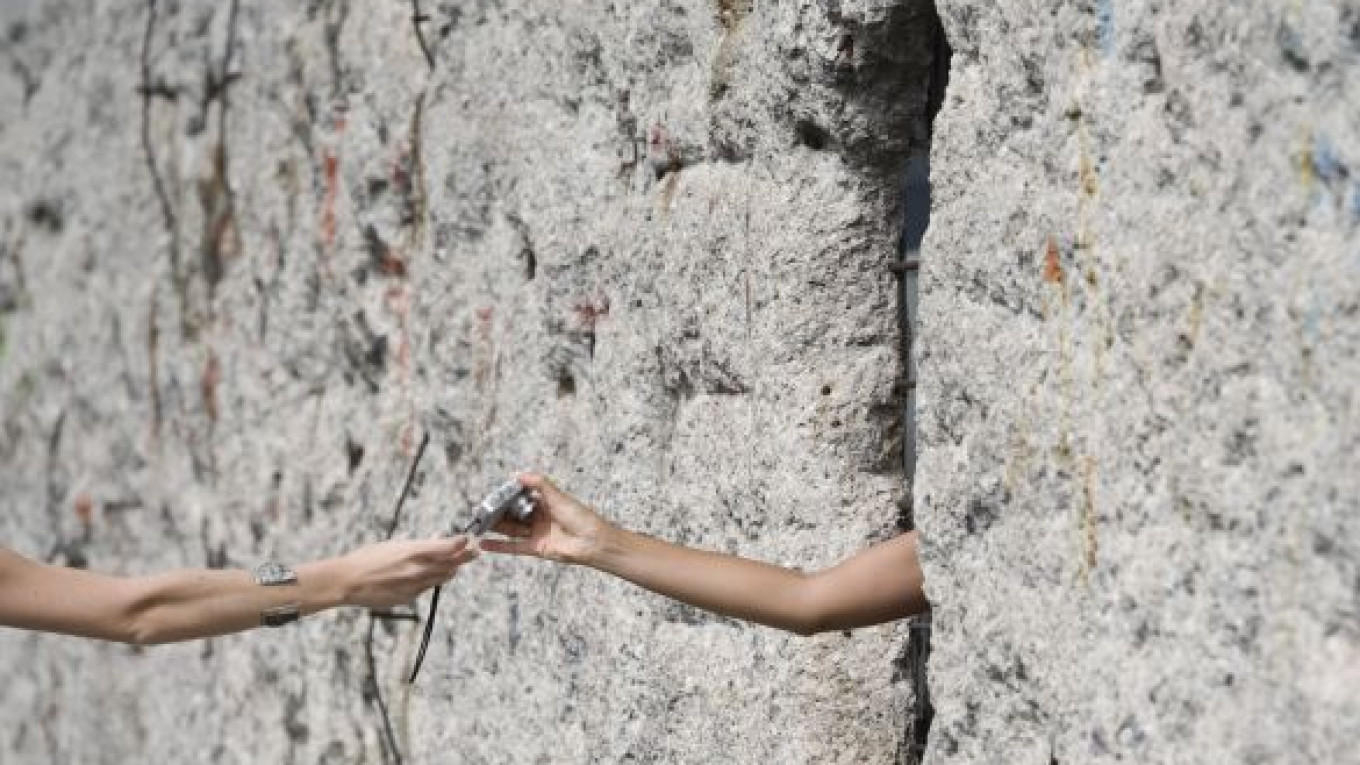BERLIN — The Berlin Wall's construction 50 years ago must be a constant reminder to citizens today to stand up for freedom and democracy, the city's mayor said over the weekend as a united Germany commemorated the bitter anniversary.
Seeing Berlin divided by the wall tore apart the country as well as separating the city's streets, neighbors and families, Mayor Klaus Wowereit said Saturday at a televised ceremony.
"It is our shared responsibility to keep the memory alive and to pass it on to the coming generations as a reminder to stand up for freedom and democracy to ensure that such injustice may never happen again," Wowereit said.
German Chancellor Angela Merkel — who grew up behind the wall in Germany's communist east — also attended the commemoration in Berlin, where parts of the wall and an attached surveillance tower now form a museum.
The road where the museum is located was divided in two on Aug. 13, 1961, and some 2,000 east German residents were expelled from their houses to allow the communist authorities to secure the new border.
The country was then divided for 28 years. Hundreds of East Germans were arrested while trying to flee to democratic West Germany and at least 136 were killed trying to cross the wall.
German President Christian Wulff said the "life-asphyxiating wall" must be a reminder to appreciate and preserve the "openness of today's world."
Germany had been divided into capitalist western and communist eastern sectors after the end of World War II. At the height of tensions between the United States and the Soviet Union, the East German regime started building the wall through the capital.
East Germany's entire border was soon fortified, making West Berlin an island of democracy and freedom behind the communist bloc's iron curtain.
"But it has been shown once again: Freedom is invincible at the end. No wall can permanently withstand the desire for freedom," Wulff said.
"The violence of the few does not withstand the quest for freedom of the many," he added. "The wall didn't just come down — it was toppled."
The division ended on Nov. 9, 1989 — after communist East Germany opened the Berlin Wall amid pressure from massive demonstrations and a softening of the Soviet Union's political stance championed by then-leader Mikhail Gorbachev.
"When I was 7 years old, I still went with my grandmother — just a few days before the construction of the wall — from East Berlin's Pankow [neighborhood] to West Berlin, and for me as a child it was totally inconceivable that Berlin was suddenly divided," Merkel said ahead of Saturday's ceremony.
"From that moment on, I couldn't go to visit my grandmother in Hamburg anymore. … I couldn't see my aunt or my cousins anymore. That, of course, marked my entire life," Merkel said in unusually personal remarks.
Today, only a few of the wall's roughly 3 1/2-meter-high concrete slabs remain standing — haunting reminders of the city's decades of division.
Part of the nearly 40-kilometer path that the wall wound through the heart of the city is marked today by a cobblestone strip, which stretches down streets and across sidewalks to remind passers-by where the wall once stood.
When the wall was first built, nobody knew what was going to happen next. Many people were afraid that it would serve as a provocation and turn the Cold War into a hot one.
Wowereit emphatically thanked all those who stood up for Berlin's freedom throughout the wall's existence, singling out former U.S. President John F. Kennedy "who gave us courage" by visiting the divided city.
On his trip in 1963, Kennedy declared "Ich bin ein Berliner [I am a citizen of Berlin]," expressing his solidarity with West Germany.
A Message from The Moscow Times:
Dear readers,
We are facing unprecedented challenges. Russia's Prosecutor General's Office has designated The Moscow Times as an "undesirable" organization, criminalizing our work and putting our staff at risk of prosecution. This follows our earlier unjust labeling as a "foreign agent."
These actions are direct attempts to silence independent journalism in Russia. The authorities claim our work "discredits the decisions of the Russian leadership." We see things differently: we strive to provide accurate, unbiased reporting on Russia.
We, the journalists of The Moscow Times, refuse to be silenced. But to continue our work, we need your help.
Your support, no matter how small, makes a world of difference. If you can, please support us monthly starting from just $2. It's quick to set up, and every contribution makes a significant impact.
By supporting The Moscow Times, you're defending open, independent journalism in the face of repression. Thank you for standing with us.
Remind me later.






